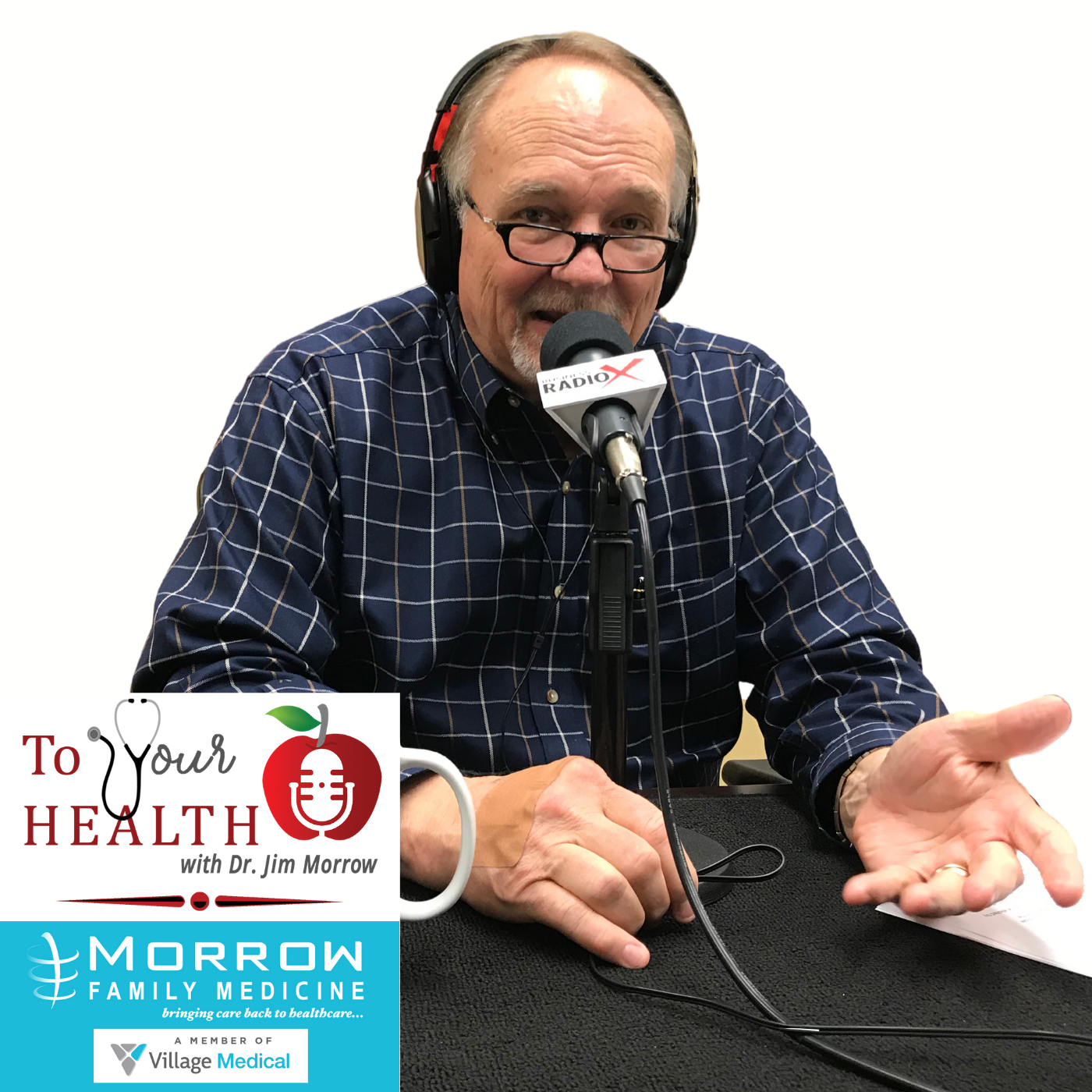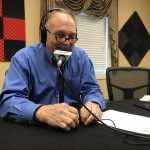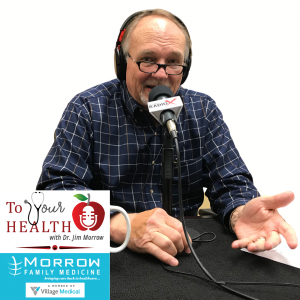
What is the Difference Between Stress and Burnout? (Episode 58, To Your Health with Dr. Jim Morrow)
In this episode, Dr. Jim Morrow addresses the characteristics of stress and burnout, the five stages of burnout, and how to tell the two conditions apart. “To Your Health” is brought to you by Morrow Family Medicine, a member of Village Medical, which brings the care back to healthcare.
About Morrow Family Medicine, A Member of Village Medical
Morrow Family Medicine, a Member of Village Medical, is an award-winning, state-of-the-art family practice with offices in Cumming and Milton, Georgia. The practice combines healthcare information technology with old-fashioned care to provide the type of care that many are in search of today. Two physicians, three physician assistants, and two nurse practitioners are supported by a knowledgeable and friendly staff to make your visit to Morrow Family Medicine, A Member of Village Medical one that will remind you of the way healthcare should be. At Morrow Family Medicine, a Member of Village Medical, we like to say we are “bringing the care back to healthcare!” The practice has been named the “Best of Forsyth” in Family Medicine in all five years of the award, is a three-time consecutive winner of the “Best of North Atlanta” by readers of Appen Media, and the 2019 winner of “Best of Life” in North Fulton County.
Village Medical offers a comprehensive suite of primary care services including preventative care, treatment for illness and injury, and management of chronic conditions such as diabetes, congestive heart failure, chronic obstructive pulmonary disease (COPD), and kidney disease. Atlanta-area patients can learn more about the practice here.
Dr. Jim Morrow, Morrow Family Medicine, and Host of “To Your Health with Dr. Jim Morrow”
 Dr. Jim Morrow is the founder and CEO of Morrow Family Medicine. He has been a trailblazer and evangelist in the area of healthcare information technology, was named Physician IT Leader of the Year by HIMSS, a HIMSS Davies Award Winner, the Cumming-Forsyth Chamber of Commerce Steve Bloom Award Winner as Entrepreneur of the Year and he received a Phoenix Award as Community Leader of the Year from the Metro Atlanta Chamber of Commerce. He is married to Peggie Morrow and together they founded the Forsyth BYOT Benefit, a charity in Forsyth County to support students in need of technology and devices. They have two Goldendoodles, a gaggle of grandchildren and enjoy life on and around Lake Lanier.
Dr. Jim Morrow is the founder and CEO of Morrow Family Medicine. He has been a trailblazer and evangelist in the area of healthcare information technology, was named Physician IT Leader of the Year by HIMSS, a HIMSS Davies Award Winner, the Cumming-Forsyth Chamber of Commerce Steve Bloom Award Winner as Entrepreneur of the Year and he received a Phoenix Award as Community Leader of the Year from the Metro Atlanta Chamber of Commerce. He is married to Peggie Morrow and together they founded the Forsyth BYOT Benefit, a charity in Forsyth County to support students in need of technology and devices. They have two Goldendoodles, a gaggle of grandchildren and enjoy life on and around Lake Lanier.
Facebook: https://www.facebook.com/MorrowFamMed/
LinkedIn: https://www.linkedin.com/company/7788088/admin/
Twitter: https://twitter.com/toyourhealthMD
The complete show archive of “To Your Health with Dr. Jim Morrow” addresses a wide range of health and wellness topics, and can be found at www.toyourhealthradio.com
Dr. Morrow’s Show Notes
Covid-19 Update
“Check my antibodies” – says nothing about immunity – need a vaccine anyway
Variants – vaccine works well so far against these new and increasingly important viruses. Previous infection does nothing to prevent infection by these variants.
“The vaccine is not a vaccine, it is gene therapy.”
“I don’t want people to get the vaccine if they live with me because then I can get the virus from them.”
HCQ has been in the news again recently. Some REPORTS, not STUDIES, said that it might help those on a ventilator. So far, All of the SCIENCE says that it does not stop this virus.
What is The Difference Between Stress and Burnout?
- Stress
- It is characterized by over engagement
- The person’s emotions are overreactive
- It gives one a feeling of urgency and hyperactivity
- It leads to loss of energy
- It leads to anxiety disorders
- Its primary damage is physical
- Burnout
- It is characterized by disengagement
- Blunted emotions
- Feelings of helplessness and hopelessness
- It makes one lose motivation, ideals, and hope
- It leads to detachment and depression
- Its primary damage is emotional
- Burnout may be as a result of excessive stress but they do not mean the same thing.
- Burnout is a cycle of
- negative emotions,
- paralysis
- and withdrawal.
- It is the body’s response to putting too much effort into something without taking in what you require to restore yourself.
- It is mental, emotional and physical exhaustion that leads to diminished interest in performing tasks.
- Physical symptoms of burnout include
- having low energy,
- headaches,
- muscle tension,
- digestive disorders,
- frequent colds and changes in one’s sleep patterns.
- Its mental symptoms include
- feeling sad,
- inadequate,
- frustrated,
- unappreciated
- and irritable.
- These symptoms can result in
- withdrawal,
- accidents,
- increased sick days and crying.
- Increased consumption of food or alcohol
- Its mental symptoms include
- Stress, on the other hand,
- involves too many pressures that demand too much from you either physically or psychologically.
- Stressed people though can still see a light at the end of the tunnel,
- they just often can’t figure a way to get to it.
- Stressed people though can still see a light at the end of the tunnel,
- Stress is just a day-to-day experience
- but burnout is a more serious consequence of the build-up of too much stress which causes the individual person to shut down.
- If stress persists on a full scale for a long period of time, there are increased risks of burnout.
- Although stress is an essential prerequisite for burnout,
- burnout is not necessarily the result of too much stress.
- For burnouts to occur there must be an additional psychological factor.
- People who are stressed can often still function
- and do all that the tasks or jobs required of them.
- This is due to the fact that different people can bear different levels of stress for different lengths of time.
- This is quite a contrast to people experiencing a burnout.
- Burnout usually leads to a total shutdown of all systems in the body
- and it causes a person to become completely nonfunctional.
- Burnout causes people to experience long-term exhaustion
and diminished interest in life as a whole.
What are the Stages of Burnout?
Stage 1 – Honeymoon
- marked by
- high job satisfaction,
- commitment,
- energy,
- and creativity,
- the key issue is what coping strategies you begin to develop when facing the inevitable stresses of the job.
- In theory, if the patterns of coping are positive, adaptive, then you will remain in the honeymoon stage indefinitely.
- But few persons do.
Stage 2 – Balancing Act
- as opposed to the unbridled optimism and positiveness of Stage 1,
- you now are clearly aware that some days are better than others as far as handling stress on the job.
- An awareness of a noticeable increase in the following is indicative of Stage 2:
- job dissatisfaction
- work inefficiency, including avoiding making necessary decisions,
- “losing” stuff at work (even on your desk!), etc.
- fatigue (a general fatigue, often accompanied by deep muscle fatigue)
- sleep disturbances (often that you are so “busy” in your head that you can’t get to sleep)
- escapist activities of choice (including eating, drinking, smoking, zoning out in front of the TV, etc.)
Stage 3 – Chronic Symptoms
- marked by an intensification of some of the same indicators cited in Stage 2, including
- chronic exhaustion
- physical illness (remember that stress is a risk factor in many diseases)
- anger
- depression
Stage 4 – Crisis
- the symptoms become critical
- physical symptoms intensify and/or increase in number
- obsessing about work frustrations increases
- pessimism and self-doubt dominate your thinking
- you develop an “escapist mentality”
Stage 5 – Enmeshment
- The symptoms of burnout are so embedded in your life that you are more likely to be labeled as having some significant physical or emotional problem than you are to be called a burnout case.
Source: Psychology Today















